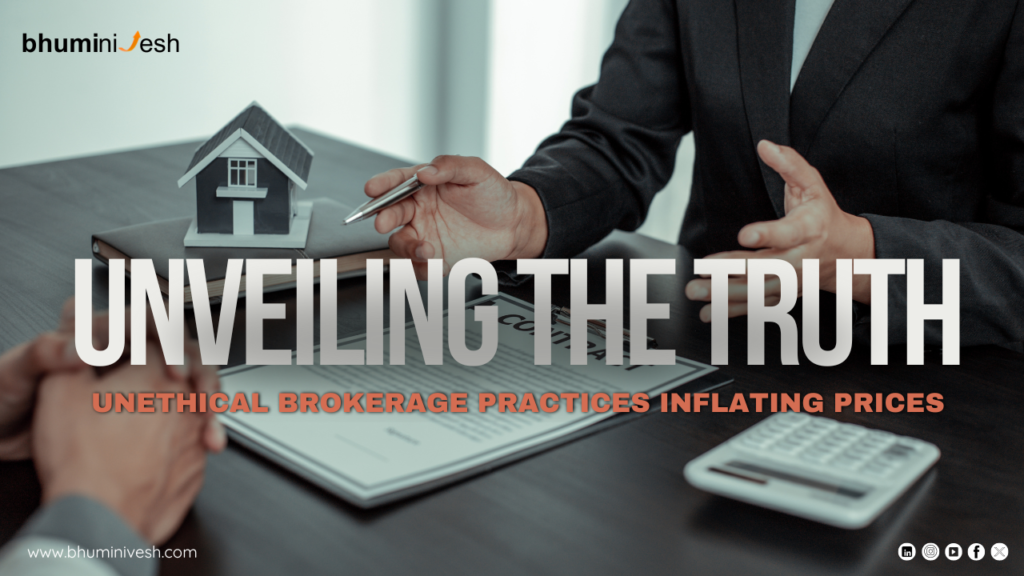
The Indian real estate market has been regarded as a dependable investment option that yields significant profits. Nonetheless, current patterns suggest that investors and buyers are becoming increasingly concerned about the fictitious inflating of real estate values by dishonest real estate brokers. This behaviour is contributing to a real estate bubble by misrepresenting the genuine value of houses and placing a heavy financial strain on buyers, all thanks to high brokerage fees.

Understanding the Real Estate Bubble
When property values grow quickly to unsustainable levels, a real estate bubble is created. Speculative buying, excessive lending, and untrustworthy intermediary tactics are frequently the causes of this inflated pricing. Prices collapse when the bubble collapses, leaving homeowners and investors with properties that are significantly worthless compared to what they spent.
The Role of Unethical Brokerage Practices
Property sellers are now known to demand much larger margins than is morally acceptable in many Indian communities. Brokerage fees should ideally be between one percent and two percent of the property’s value. In actuality, dealers frequently charge 5% to 20% profits in several cities in India. The selling price of houses is greatly inflated by this illegal markup.
For instance, a property valued at ₹80 lakhs is being sold for ₹1 crore, reflecting a 20% dealer margin. The buyer, unaware of the actual market value, ends up paying ₹1 crore, assuming it to be a fair price. This inflated pricing not only affects individual buyers but also skews market valuations, leading to widespread overvaluation of real estate.

Impact on Buyers and the Market
1 Buyer Financial Burden: Purchasers of real estate at inflated prices are immediately put in a difficult financial situation. The extra expense is paid up front rather than being spread out over a longer time frame through natural appreciation. Longer payback terms, higher EMIs, and larger loan amounts may result from this.
2 Market Misalignment: A deceptive market environment is produced by artificially inflated real estate prices. The perceived high costs discourage sincere buyers and investors, which lowers market activity overall. This may result in less market liquidity, which would make it more challenging for sellers to locate buyers.
3 Delayed Real Returns: When buyers pay inflated prices, the actual appreciation of property value takes much longer to match the amount paid. For example, a property purchased for ₹1 crore might take 2 to 3 years to naturally reach that valuation if its true market value was ₹80 lakhs at the time of purchase. During this period, the buyer sees no real return on investment.
4 Increased Risk of a Bubble Burst: The consistent overvaluation of properties heightens the risk of a real estate bubble. When market corrections occur, property prices can drop sharply, leading to significant losses for buyers who purchased at inflated prices.
Case Studies and Data Insights
The growing worry over inflated property prices in India is highlighted by a number of research and reports. Knight Frank reports that price increases in the Indian real estate market have been irregular and not necessarily supported by supply and demand. Residex index data from the National Housing Bank also reveals that several cities have had abnormal price spikes over brief periods of time, which is suggestive of speculative activity.
In a matter of years, the average growth in income or rental yields in places like as Delhi and Mumbai have not been able to match the over 30% increase in property values in these areas. This difference suggests that large brokerage profits and speculative investments are the cause of the inflated prices.
Moving Towards Ethical Practices
Addressing this issue requires concerted efforts from multiple stakeholders:
1 Transparency and Regulation: Stricter rules on brokerage fees must be implemented by the government and regulatory organizations in order to guarantee openness in real estate transactions. Although the Real Estate (Regulation and Development) Act (RERA) is being implemented, more enforcement and education are required. This is a positive beginning.
2 Awareness of Consumers: It is important for buyers to understand the fair market value of properties as well as typical brokerage costs. Having access to trustworthy and precise tools for property appraisal can enable buyers to make well-informed choices.
3 Ethical Business Practices: In order to ensure that their fees accurately reflect the value they bring to the transaction, real estate brokers and agents are required to follow ethical business practices. Industry associations have a big say in what standards are established and upheld.
Conclusion :
In the Indian real estate industry, one of the most important issues is the artificial inflation of property prices brought on by hefty brokerage fees. Buyers may safeguard themselves against overpaying and encourage the market to shift toward more ethical and sustainable practices by being aware of the underlying causes and adopting preventative action. In order to guarantee that the real estate market continues to be a reasonable and feasible investment option for everyone, it is imperative that all players work together.


